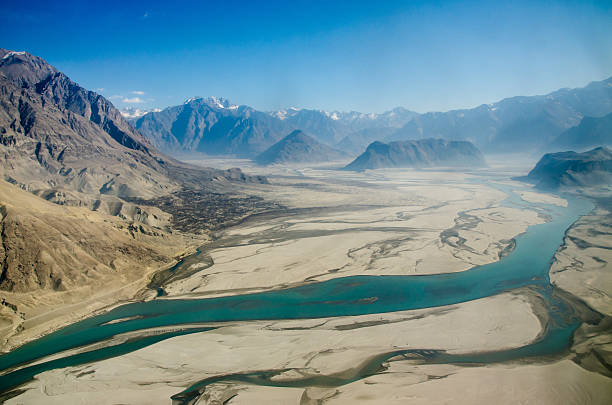 |
| indus river |
The water issue between Pakistan and India is a significant aspect of their bilateral relations, rooted in the shared waters of the Indus River Basin. Since the partition of British India in 1947, both countries have been dependent on these rivers for agriculture, drinking water, and energy production. To manage water distribution, the Indus Waters Treaty (IWT) was signed in 1960 with the mediation of the World Bank. This treaty gave Pakistan three western rivers—Indus, Jhelum, and Chenab—and three eastern rivers—Ravi, Beas, and Sutlej—to India. Tensions have occasionally arisen as a result of India's construction of hydroelectric projects on the western rivers and Pakistan's concerns regarding potential disruptions to its water supply, despite the fact that the treaty has been successful in regulating water sharing for decades. The issue is further complicated by climate change, increasing water demand, and political conflicts between the two nations. Water security remains a crucial and sensitive factor in Indo-Pak relations, often reflecting broader geopolitical tensions.
The Indus Waters Treaty (IWT)
The Indus Waters Treaty was brokered by the World Bank and signed in 1960 by then Indian Prime Minister Jawaharlal Nehru and Pakistani President Ayub Khan. The treaty aimed to provide a framework for water-sharing between the two countries. The treaty states that:
The eastern rivers of Ravi, Beas, and Sutlej were given to ndia.
The western rivers Indus, Jhelum, and Chenab were given to Pakistan.
India was allowed limited use of the western rivers for non-consumptive purposes such as irrigation, power generation, and navigation.
The treaty has been put to the test numerous times because of disagreements regarding the use of water, the construction of dams, and the growing scarcity of water.
Key Water Disputes
Several major disputes have emerged over time, including:
Baglihar Dam Dispute: Pakistan objected to India’s construction of the Baglihar Dam on the Chenab River in 2008, claiming it violated the treaty. The matter was brought before the World Bank, which decided that even though India had the right to build the dam, it needed to change its design so that it wouldn't hurt Pakistan too much.
Kishanganga Hydroelectric Project: Another point of contention was this project on the Kishanganga River, which is a Jhelum tributary. Pakistan took the issue to the Permanent Court of Arbitration (PCA) in The Hague, which allowed India to continue but with modifications to safeguard Pakistan’s water supply.
Ratle Dam Dispute: Pakistan has objected to India's construction of the Ratle hydroelectric project on the Chenab River, arguing it violates the treaty’s provisions. The dispute remains unresolved and has contributed to rising tensions.
Impact of the Dispute
The water dispute has several implications for both countries:
Agricultural Dependency: Pakistan heavily relies on the Indus River for irrigation, with over 90% of its agricultural sector depending on it. Any decrease in the flow of water can have devastating effects on food security.
Hydroelectric Power Generation: Both nations depend on water for hydroelectric power. Energy production can be impacted, causing economic growth and stability to be impacted.
Climate Change and Water Scarcity: Changing climate patterns, shrinking glaciers, and population growth have exacerbated water stress in both countries. Conflict over shared resources is more likely to arise as a result of this.
Geopolitical Tensions: Water disputes exacerbate diplomatic tensions and frequently serve as a political instrument during times of increased conflict.
The Way Forward
To address the water dispute, the following steps can be considered:
Strengthening Dialogue: In order to amicably resolve water disputes, both nations ought to engage in ongoing diplomatic talks.
Revisiting the IWT: Given the changing climatic conditions and rising water demands, revisiting the treaty’s provisions may be necessary to ensure equitable distribution.
Third-Party Mediation: International organizations such as the World Bank or United Nations can play a crucial role in mediating disputes.
Improved Water Management: Water conservation, effective irrigation methods, and joint projects that encourage sustainable water use must be funded by both nations.
The water dispute between Pakistan and India remains a critical issue that needs urgent attention. While the Indus Waters Treaty has provided a legal framework for water-sharing, increasing tensions and environmental challenges require renewed diplomatic efforts. Sustainable and cooperative water management is essential to prevent further conflict and ensure a stable future for both nations.






.jpeg)







.jpeg)
0 Comments